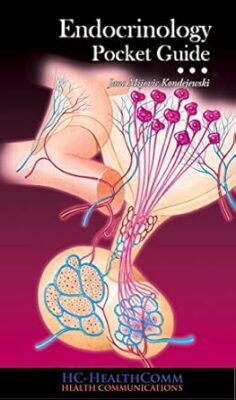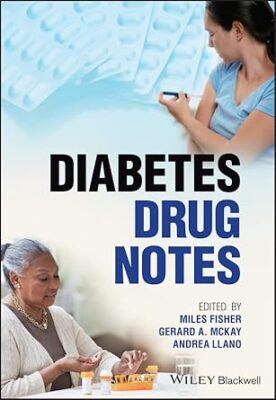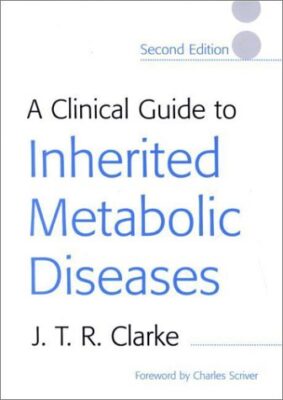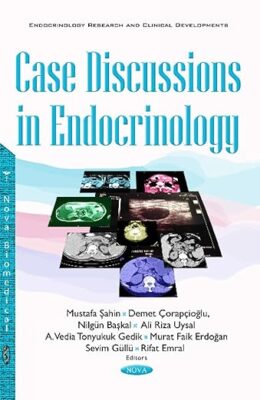Endocrinology Pocket Guide: Full illustrated
Endocrinology Pocket Guide, Full illustrated.
Chapter 1: Introduction to the Endocrine System
The endocrine system is a network of glands that secrete hormones directly into the bloodstream, controlling physiological events throughout the body (Figure 1.1). Endocrine function and hormone action mediate long-term effects by acting on all cellular processes and systems. They influence growth and development, tissue function, metabolism, reproduction, sexual development, fluid and nutrient homeostasis, and behavior.
Table of Contents
Abbreviations
Chapter 1: Introduction to the Endocrine System
The endocrine system
Hormones
Steroid hormones
Protein and peptide hormones
The endocrine system and feedback loops
Endocrine disorders
Conclusion
Chapter 2: Normal Endocrine Physiology
Introduction
Endocrine glands and hormones
Endocrine gland hierarchy
The hypothalamus
The pituitary gland
The pineal gland
Peripheral endocrine glands
The thymus
The thyroid gland
The parathyroid glands
The adrenal glands
The pancreas
The ovaries
The testes
Conclusion
Chapter 3: Growth and Metabolism Endocrine Disorders
Introduction
Growth hormone disorders-overview
IGF, GH, and GHR deficiencies
Epidemiology
Symptoms
Guidelines for GHD diagnosis and management
Prognosis
Special concerns
Acromegaly
Epidemiology
Symptoms
Guidelines for acromegaly diagnosis and management
Prognosis
Special concerns
Pancreatic disorders
DM-overview
Epidemiology
Symptoms
Guidelines for DM diagnosis and treatment
Prognosis
Special concerns
Obesity-overview
Epidemiology
Symptoms
Guidelines for obesity diagnosis and management
Prognosis
Special concerns
Thyroid Disorders-overview
Hyperthyroidism
Epidemiology
Symptoms
Guidelines for hyperthyroidism diagnosis and management
Prognosis
Special concerns
Hypothyroidism
Epidemiology
Symptoms
Guidelines for hypothyroidism diagnosis and management
Prognosis
Special concerns
Parathyroid disorders-overview
Hyperparathyroidism
Epidemiology
Symptoms
Guidelines for hyperparathyroidism diagnosis and management
Prognosis
Special concerns
Hypoparathyroidism
Epidemiology
Symptoms
Guidelines for hypoparathyroidism diagnosis and management
Prognosis
Special concerns
Conclusion
Chapter 4: The Reproductive System and Endocrine Disorders
Introduction
Menopause and postmenopause-overview
Epidemiology
Symptoms
Guidelines for diagnosis and management of menopause
Prognosis
Special concerns
Gynecomastia-overview
Epidemiology
Symptoms
Guidelines for gynecomastia diagnosis and management
Prognosis
Special concerns
Hirsutism-overview
Epidemiology
Symptoms
Guidelines on evaluation and management of hirsutism
Prognosis
Special concerns
Erectile dysfunction-overview
Epidemiology
Symptoms
Guidelines on ED diagnosis and management
Prognosis
Special concerns
Conclusion
Chapter 5: Genetics, Epigenetics and Endocrinology
Introduction
Endocrine genetics
Endocrine epigenetics
Epigenetics and endocrine disrupters
The genetics and epigenetics of growth and metabolism
The genetics of growth
GH or IGF deficiencies
The epigenetics of growth
The genetics of thyroid function
The epigenetics of thyroid function
The genetics and epigenetics of the parathyroid function
The epigenetics of pseudohypoparathyroidism
The genetics and epigenetics of pancreatic function
The genetics of T2D and obesity
The epigenetics of T2D and obesity
The genetics and epigenetics of reproductive endocrinology
The genetics and epigenetics of menopause
Epigenetics, epigenetic disrupters, and menopause
The genetics and epigenetics of postmenopausal status
The genetics and epigenetics of gynecomastia
The genetics and epigenetics of erectile dysfunction
The genetics and epigenetics of hirsutism
Conclusion
Chapter 6: Links
Selected References
DOWNLOAD THIS MEDICAL BOOK










